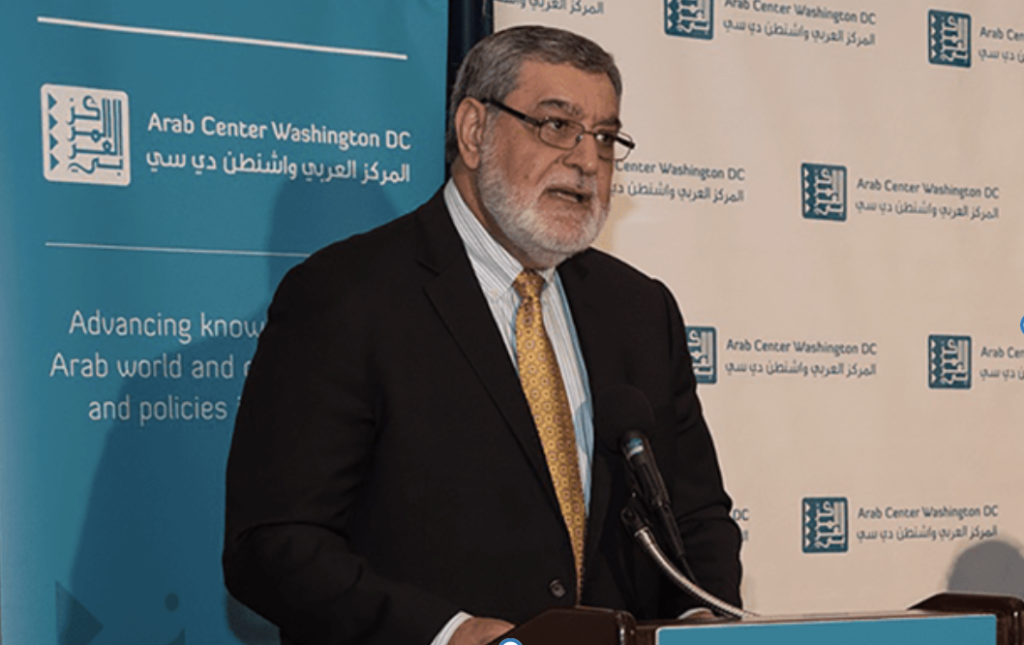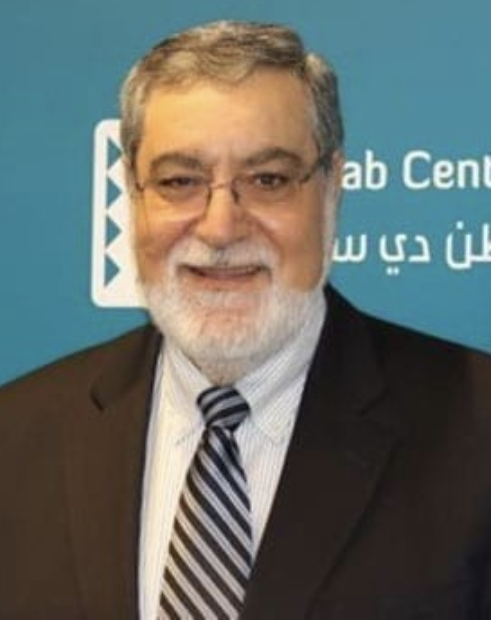Pathbreakers of Arab America—Khalil Jahshan

By: John Mason / Arab America Contributing Writer
This is the fifty-ninth of Arab America’s series on American pathbreakers of Arab descent. The series includes personalities from entertainment, business, sports, science, academia, journalism, and politics, among other areas. Our fifty-ninth pathbreaker is Khalil Jahshan, a Palestinian-American political analyst, media commentator, and organization executive. He serves as Executive Director of Arab Center Washington DC, a nonprofit think tank focusing on U.S. foreign policy in the Middle East. Khalil is impassioned by the long-festering Israeli Palestinian issue and a fervent supporter of Palestine.
A master of organizational management, Khalil Jahshan directs full focus to solving the Israel-Palestinian problem
Jahshan was born in Nazareth, British Mandate of Palestine, in 1948 to a Palestinian Christian family. He completed his elementary (Ecole Jesu Adolescent-Don Bosco) and secondary (Terra Sancta) education there. In 1969, he traveled to the United States to pursue his college education at Harding University. He serves as Executive Director of Arab Center Washington DC, a nonprofit think tank focusing on U.S. foreign policy in the Middle East.
According to Wikipedia’s series on Arab Americans, between 2004 and 2013, Jahshan was a Lecturer in International Studies and Languages at Pepperdine University and Executive Director of its Seaver College Washington DC Internship Program. He received a bachelor’s degree in political science and French from Harding University in 1972. Khalil is a member of the boards of directors and advisory boards of various Middle East-oriented groups, including ANERA, MIFTAH, and Search for Common Ground in the Middle East.
He has held numerous leadership positions in Arab American organizations, including Vice President of the American Committee on Jerusalem, President of the National Association of Arab Americans, National Director of the Association of Arab-American University Graduates, Assistant Director of the Palestine Research and Educational Center, and Lecturer in Arabic at the University of Chicago Extension and at Northwestern University in Evanston, Illinois.

Jahshan on former U.S. policy shift moving Israeli capital to Jerusalem and the overall folly of the Trump-Kushner-Greenblatt plan
On January 10, 2018, in an address to the Washington Institute of Foreign Affairs, Khalil expressed strong feelings about the then-current Palestinian-Israeli relations. He was especially disturbed by the impact of former President Trump’s December declaration recognizing Jerusalem as Israel’s capital and directing the Department of State to begin the process of moving the American embassy there.
Jahshan’s starting point was the 1967 occupation by Israel of the Palestinian territories of the West Bank and Gaza, including Jerusalem. Additionally, he noted that November 2, 2017, commemorated the 100th anniversary of the Balfour Declaration, a statement of British support for “the establishment in Palestine of a national home for the Jewish people.” This declaration has had significant long-term effects and remains relevant to contemporary Palestinian affairs.
Referring to the 1967 occupation, Khalil noted, “Israel’s military occupation remains as pervasive and as deeply entrenched as ever to the detriment of Arab, Israeli, and American interests alike. The realistic expectation of a comprehensive, just, and lasting peace today has become virtually an expression of utter naiveté and total disregard for facts on the ground.”
His depiction of the situation in Palestine in 2018 applies equally to today’s: [it] “is quite dismal. Most experts agree that the economic, humanitarian, political, and security situation in occupied Palestine is beyond untenable. The protracted dehumanization, internal colonization, and dispossession of the Palestinian people cannot and should not be tolerated indefinitely. This is not stemming from purely Palestinian analysis or wishful thinking on my part, but also from analyses by sane Israelis who have come to the same conclusion.”
Jahshan’s assessment of who’s to blame for the state of affairs of the Arab-Israeli conflict includes Israel, Palestine, the Arab world, the world community, and, not insignificantly, the U.S. At the time of his speech in early 2018, he placed significant blame on the so-called Trump-Kushner-Greenblatt Plan.
Part of this plan was to declare Jerusalem Israel’s capital, about which Khalil noted, “Many experts deemed the announcement ill-advised, ill-conceived, ill-timed, unnecessary, potentially catastrophic, and very dangerous to regional peace and stability. Most importantly, from my perspective, it dealt a deathblow to historical American mediation efforts between Israelis and Palestinians and ended the quest for Trump’s own ‘ultimate deal.’”
Another aspect of the Trump-Kushner-Greenblatt Plan was Jared’s peace ploy to strip Palestinian refugees in Jordan of their status, thus destabilizing one of America’s closest allies in the region. Cited in Jahshan’s article in ‘Foreign Policy,’ he avers, “In presenting their ill-conceived plan to Jordanian officials, U.S. peace negotiators Jared Kushner and Jason Greenblatt have demonstrated a bias and ineptitude that will derail Washington’s self-proclaimed peace plan and further undermine U.S. credibility in the Middle East.”
Jahshan was critical of another aspect of the Kushner plan: trying to disrupt the United Nations Relief and Works Agency (UNRWA) program in Jordan. UNWRA has, for almost seven decades, cared for the poorest refugees, operating 171 schools and serving more than 121,000 students. Its 25 primary health centers handle more than 1.5 million visits annually, and ten recognized refugee camps shelter around 370,000 refugees. According to Khalil, “Kushner’s idea was to strip refugee status from all but the few living Palestinians who fled British Mandatory Palestine in 1948—a plan that reveals a profound ignorance of Jordan’s current political and economic woes.”
Jahshan took on Kushner directly, saying, “[He] seems convinced that UNRWA ‘perpetuates a status quo, is corrupt, inefficient and doesn’t help peace. President Donald Trump’s son-in-law turned senior advisor, who lacks any credible diplomatic experience in Middle East affairs, expressed his view that ‘Sometimes you have to risk breaking things in order to get there strategically.’ What he fails to understand is that his half-baked plan risks undermining the legitimacy and sovereignty of Jordan, Washington’s closest ally and partner in the Middle East.”
Some officials in the Trump administration might naively consider Jordan too weak to resist U.S. pressure to accept White House commands. Jordan is certainly a close U.S. ally that is significantly dependent on U.S. aid. However, having survived many existential challenges since 1946, Jordan’s monarchy is unwilling to commit national suicide just to please Washington.”
A snippet of Jahshan’s recent views on the Gaza war
Following Secretary of State Antony J. Blinken’s eighth diplomatic trip to the Middle East since the beginning of the Gaza war on October 7, 2023, Khalil discussed his view of progress in ending that war in an Arab Center article. His view of Biden’s success in that endeavor was skeptical. It built on the skepticism of the mediating parties and other Arab and Muslim officials he met at the Gaza aid conference, specifically, that “the American effort was viewed with widespread skepticism throughout the region.”
Khalil’s explicit criticism of U.S. policy is captured in his statement, “The US administration openly displayed an inherent bias and annoyance with the Palestinian side.” Furthermore, he made clear the content of such bias: “In contrast to its blatantly tolerant and quite flexible attitude toward frequent acts of obstruction and lack of cooperation by the Netanyahu government, the US administration openly displayed an inherent bias and annoyance with the Palestinian side despite its cautious characterization of the initial Hamas response to the American plan as ‘hopeful.’”
Now that the Israeli war has expanded into Lebanon against Hezbollah, the implementation of the Blinkin ceasefire proposal has become much more complicated.
Nevertheless, we look forward to Khalil Jahshan’s continued role in making sense of this seemingly endless, intractable problem through his organizational leadership and incisive analysis of the Israel-Palestine issue.
Sources:
–“Khalil Jahshan,” Wikipedia Series on Arab Americans, 2024 “ACW
–“President Trump’s Policy Shift on Jerusalem: Impact on Arab-Israeli Peacemaking,” Executive Director Jahshan addresses the Washington Institute of Foreign Affairs, 1/18/201,
–“Jared Kushner’s Peace Plan Would Turn Jordan Upside Down,” Khalil Jahshan, Foreign Policy, 10/5/2018
–“Desperately seeking support for Biden’s plan on Gaza,” Khalil Jahshan, Arab Center in Washington, 6/18/2024
John Mason, Ph.D., focuses on Arab culture, society, and history and is the author of LEFT-HANDED IN AN ISLAMIC WORLD: An Anthropologist’s Journey into the Middle East, New Academia Publishing, 2017. He has taught at the University of Libya, Benghazi, Rennselaer Polytechnic Institute in New York, and the American University in Cairo; John served with the United Nations in Tripoli, Libya, and consulted extensively on socioeconomic and political development for USAID and the World Bank in 65 countries.
The views and opinions expressed in this article are those of the author and do not necessarily reflect the position of Arab America. The reproduction of this article is permissible with proper credit to Arab America and the author.
Check out our Blog here!








